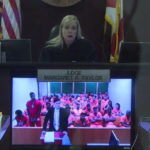 The presumption of innocence is a bedrock principle in our criminal jurisprudence and guaranteed in the Bill of Rights. However, that principle may have been tested when a judge in a case involving a USF football player spoke out against the accused, his coach, and USF in general.
The presumption of innocence is a bedrock principle in our criminal jurisprudence and guaranteed in the Bill of Rights. However, that principle may have been tested when a judge in a case involving a USF football player spoke out against the accused, his coach, and USF in general.
On Wednesday, USF defensive end LaDarrius Jackson appeared in a Hillsborough County Judge’s courtroom. The judge had harsh words for the football player and first-year coach Charlie Strong. The video of her commentary went viral and has stirred reaction on the USF campus as well as from legal experts concerning judicial behavior. She has now recused herself from the Jackson case but the damage may have already been done. Here’s what she said: “If these allegations against you are true, I must say that your behavior is nothing short of outrageous,” the judge told Jackson, handcuffed and dressed in a jail-issued red inmate’s jumpsuit.
“I graduated from USF in 1989, long before there was a football team. And while USF may not be the top-ranked school in the nation, I was never ashamed of being an alum until now. I’m embarrassed and ashamed, Mr. Jackson. Let’s just say my USF diploma is not proudly hanging in my office right now.”
“In the last couple of months there have been two arrests of your players for very violent felonies (including Hassan Childs’ road rage-related arrest),” the judge continued.
“This court, and I’m sure I’m not alone, questions whether you have control over your players. It’s fairly clear that you do not have control of them off the field. And I guess only time will tell whether you have control over them on the field.
“I would implore you to think long and hard about whether being head coach at USF is a good fit for you, before any other members of this community have to suffer at the hands of one of your players.”
Neither Childs nor Jackson were recruited by Strong, who was hired in December. Childs was dismissed from the team only a couple of days after his arrest in March.
The issue at hand is the constitutionally guaranteed right to the presumption of innocence and the judge’s behavior in this case. If I were representing Mr. Jackson I might file a motion for recusal. Judges are supposed to be fair and impartial but in this instance I’m not sure that anyone could call this fair and impartial, that may be why she decided to recuse herself from the case. To be fair, not everyone agrees with my opinion.
Charles Rose, a professor at Stetson University College of Law, said nothing in Taylor’s remarks toward Jackson or Strong is in violation of “judicial ethics or canons.”
“The only issue that you could probably allege if you were a defense attorney is she’s somehow shown a bias against USF football,” Rose said. “But her language was carefully crafted and calculated to prevent that from happening.”
Rose said such a criticism would be bolstered if it became part of a pattern of behavior by the judge. But there is no indication that is the case with Taylor.
“She’s trying to send a message from the bench about the appropriateness of the behavior,” he said.
Anyway, the judge did the right thing in the end and recused herself from the proceedings. Officers of the court have a tremendous responsibility and it is not always easy adhering to the high standards of conduct. However, such high standards are necessary to uphold the integrity of our system and the rule of law.
